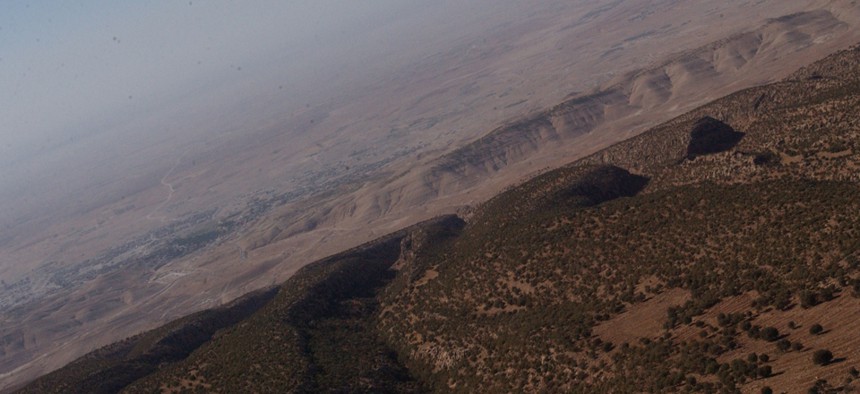
Mt. Sinjar in 2006. Defense Department file photo
U.S. Deems Iraq Rescue Mission Unlikely As Thousands Escape Mt. Sinjar
An assessment team determined that thousands had already escaped the mountain.
A U.S. military operation to evacuate stranded Yazidis on Mt. Sinjar in Iraq is "far less likely" after an assessment team determined that thousands had already escaped the mountain, the Pentagon said Wednesday night.
The group of about 20 personnel, who were accompanied by members of USAID, found that there were "far fewer Yazidis on Mt. Sinjar than previously feared, in part because of the success of humanitarian air drops, air strikes on ISIL targets, the efforts of the Peshmerga and the ability of thousands of Yazidis to evacuate from the mountain each night over the last several days," said Rear Admiral John Kirby, a Defense Department spokesman, in a statement Wednesday.
Kirby noted that the assessment team "did not engage in combat operations" and was returned safely to Irbil by air after its mission.
Defense Secretary Chuck Hagel echoed that statement in comments to reporters at Andrews Air Force Base, and Pentagon officials told The New York Times that a combination of U.S. airstrikes and Kurdish forces had effectively broken the siege of Mt. Sinjar laid by the Islamic State of Iraq and the Levant.
"The situation is much more manageable," one official told The Times. Thousands of Yazidis remained on the mountain as opposed to the tens of thousands who were initially stranded with dwindling food and water, and some of those remaining indicated to Americans they did not plan on leaving.
The assessment occurred quickly and came just hours after Ben Rhodes, the deputy national security adviser, told reporters in Martha's Vineyard that President Obama was considering a rescue mission on Sinjar that could have put U.S. forces on the ground.
Here is the full Pentagon statement from Kirby:
As part of the ongoing humanitarian efforts ordered by President Obama, today a team of U.S. military personnel, accompanied by USAID, conducted an assessment of the situation on Mt. Sinjar and the impact of U.S. military actions to date. The team, which consisted of less than twenty personnel, did not engage in combat operations and all personnel have returned safely to Irbil by military air. The team has assessed that there are far fewer Yazidis on Mt. Sinjar than previously feared, in part because of the success of humanitarian air drops, air strikes on ISIL targets, the efforts of the Peshmerga and the ability of thousands of Yazidis to evacuate from the mountain each night over the last several days. The Yazidis who remain are in better condition than previously believed and continue to have access to the food and water that we have dropped. Based on this assessment the interagency has determined that an evacuation mission is far less likely. Additionally, we will continue to provide humanitarian assistance as needed and will protect U.S. personnel and facilities."
Separately on Wednesday, the United Nations announced that it had declared the humanitarian crisis in Iraq the highest level of emergency after four children were killed in fighting between Iraqi troops and Sunni militants.
The declaration triggers an additional amount of aid to the area, said Nickolay Mladenov, the U.N. special representative for Iraq.
Given the scale and complexity of the current humanitarian catastrophe, this measure will facilitate mobilization of additional resources in goods, funds and assets to ensure a more effective response to the humanitarian needs of populations affected by forced displacements."






